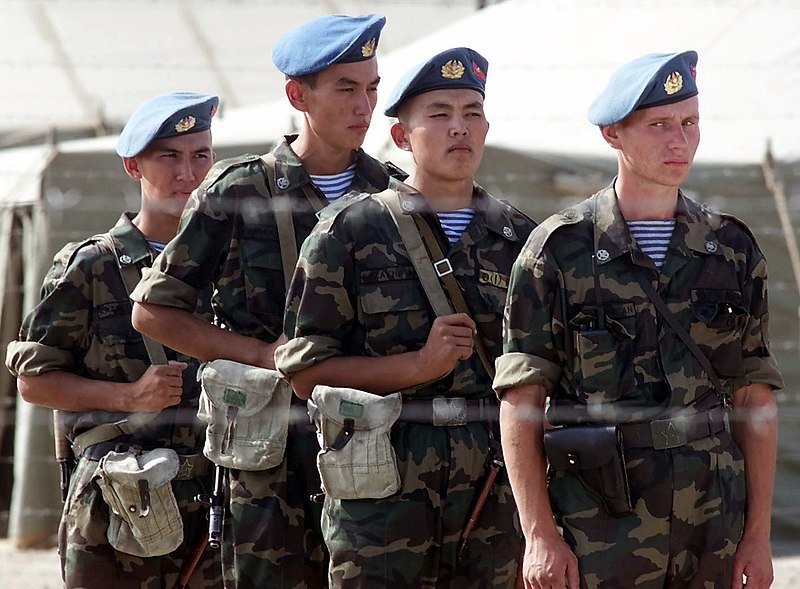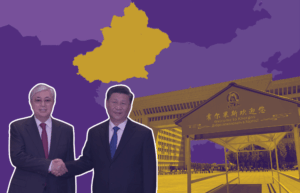Many Central Asian migrants have joined the Russian army since partial mobilisation was announced in Russia. They are being pulled into Russia’s war in Ukraine against the advice of their countries’ consular organs.This article was oroginally published on Novastan’s French website on 19 October 2022.
On 21 September, Russian President Vladimir Putin announced the mobilisation of 300 000 reservists, called up from a pool of 25 million potential fighters. Some of these are seasonal workers and precariously employed migrants from Central Asia. Russia amended their federal law “On Conscription and Military Service” in 2013 so that every young person with Russian citizenship is required to perform mandatory military service, even when they have already served it in their land of origin. According to reports by the Kyrgyz news portal Kaktus, recruitment of Central Asian migrants has taken place in the Sakharovo migration center in Moscow since 21 September. This marks a turning point in the war, as the government is no longer hiding their desire to recruit foreigners to expand the ranks of their army. There are no official figures for how many Central Asian citizens have been recruited to fight in Ukraine. According to Radio Azattyq, the Kazakh branch of Radio Free Europe, the overwhelming majority of Central Asian migrants come from three countries: Kyrgyzstan, Tajikistan, and Uzbekistan.
High salaries and Russian passports as bait
Russian recruitment authorities want to mobilise migrants from Central Asia and do so by promising high salaries and Russian citizenship. In some cases, the authorities use subterfuge. “They told us that there was a lot of construction happening in Kherson and that we have to go there. And that we could expect salaries of 220 000 rubles (£3065.94),” one witness told Eurasianet. “Some from our group went but it turned out they had been taken along to fight.” The lure of profit and citizenship is an effective mode of manipulation. The use of migrants and refugees in war is, according to an article in the American journal Foreign Affairs, a widespread phenomenon. Their lives are used like chess pieces in the game of war. The Russian human rights activist Valentina Chupik spoke with Central Asian media agency CABAR about her experiences with Tajik migrants in an interview. According to Chupik, many have said that they have received anonymous calls from law enforcement officials with offers to join the Russian army and receive Russian citizenship within three months. Furthermore, one of the Tajik migrants questioned said that some of his friends and relatives had decided to serve in the army in order to earn more money to send home to their families. Even before partial mobilisation was announced, people with a Central Asian background or nationality were recruited. In fact, an investigation by MediaHub discovered that in Uzbekistan, certain online platforms advertising security-related jobs in Russia actually sent workers directly to a military base controlled by the private Wagner Group. This Russian mercenary group is used in wars worldwide, including in Ukraine. Ukrainian intelligence agencies say that “Central Asian recruitment campaigns for mercenaries” have been in operation since the beginning of the war.
The embassies react
The embassies from Tajikistan, Uzbekistan, and Kyrgyzstan have called on their citizens not to involve themselves in the war in Ukraine. They claim that involvement is a criminal offense according to the domestic laws of their respective countries. The risk of being sucked into the war is particularly high for young men from Kazakhstan, Kyrgyzstan, and Uzbekistan who have already acquired Russian citizenship. With a diaspora of 650 000 Kazakhstanis, 1.9 million Uzbekistanis, and 104 000 Kyrgyzstanis (numbers from 2002), able-bodied men from these groups could be subjected to forced recruitment. For Turkmen, Tajik, and Uzbek citizens, participation in a foreign conflict can lead to imprisonment upon returning home. Particularly affected by this are the 1.2 million Tajik migrant workers (number from 2021) in Russia.
Originally written in French by Matthieu Petrov
Translated into German from French by Robin Roth
Translated from German into English by Mari Paine
Edited by Maya Ivanova
For more news and analysis from Central Asia, follow us on Twitter, Facebook, Telegram, Linkedin or Instagram.
 How Russia is recruiting Central Asian soldiers for its war in Ukraine
How Russia is recruiting Central Asian soldiers for its war in Ukraine 



